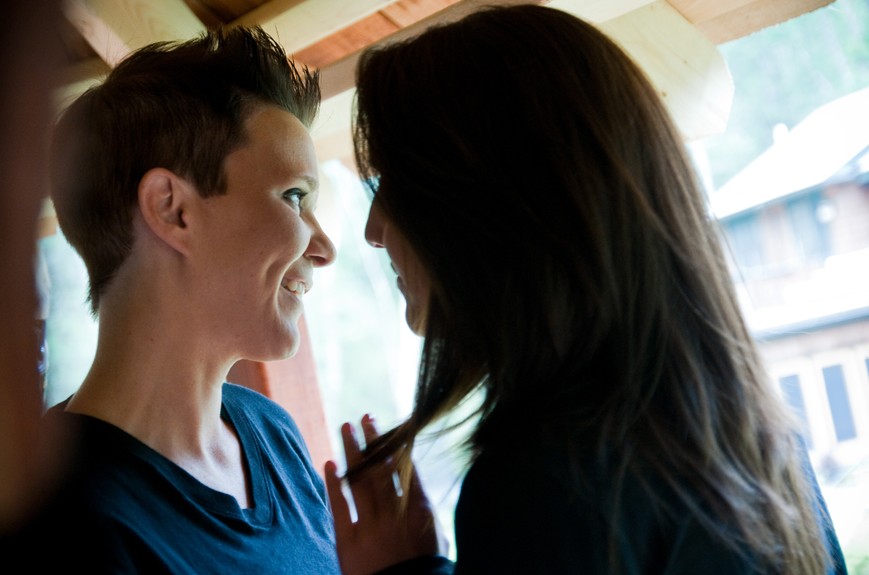We’ve all been there – bored of your “normal” sexual routine, but unaware of what you can do to spice it up.
Toys are an option, but not everyone’s into them (and any that are worth anything are so expensive!). You could try role playing, but somehow that just seems like you’re pretending, and with an overly anxious partner it may lead them to believe that they’re not actually what you want (even if that couldn’t be further from the truth).
So, what’s left – what can you do to spice up the ordinary to make it extraordinary again?
Maybe a change of position may be in order.
Some may argue that lesbian sex can really only occur in a few positions in the first place – but those people in particular could benefit from this list. The truth is, there are hundreds upon hundreds of possible positions to get to your lover – and if you’re not utilizing all of them, it’s no wonder you’re in a slump!
In order to make this list, the position has to be achievable by a beginner – because believe it or not, trying out sexual positions that you’re not properly prepared for can cause serious injuries (not to mention embarrassment if this is a new partner).
Additionally, they have to be useful with or without toys. Not everyone enjoys toys, and that’s ok. Take a look at the top 10 positions that should be added to your repertoire immediately!
69
Ok, so this one is probably in your inventory already – it’s considered one of the basics. However, if you’re not familiar with the position, this is where one partner lays on top of the partner, such that their bodies resemble the reflection between the numbers “6” and “9” – that is, each head between the legs of the other partner. This is best suited for partners who are similar in size, or where one partner is smaller (in which case the smaller partner will probably choose to be on top), however if there is a fair amount of trust in your relationship, it can go either way. It’s great because you and your partner can stimulate each other simultaneously, and it allows for the possibility (but not the guarantee!) of simultaneous climax. Once you get the hang of it, or if you’re particularly flexible, you can even try it standing!

Scissoring
Scissoring (also referred to as tribadism or “tribbing”) has a bit of a mixed reception among lesbians. Some women swear by it, while others swear it simply doesn’t do anything. In my experience, however, it can be wonderful as long as you know what you’re doing. In order to do this, you and your partner should be similar sizes (preferably smaller) and reasonably flexible.
You will then rub yourself against each other – whether that means against her leg, or directly crotch-to-crotch is up to you. It provides an intense amount of stimulation and it can get quite messy. It can be difficult to achieve climax this way, but it works wonders when used to get the juices flowing and provides the necessary motivation to proceed to other activities if you desire. Additionally, you can even do this with clothes on for a bit of quick stimulation.

The Spoon
This position is great because it allows full physical contact with your partner – something that’s often left out of lesbian sexual experiences. In order to perform “the spoon”, one partner will need to be positioned behind the other partner, laying down in bed. She will then reach her hand over and start rubbing… And, well, I’m sure you can imagine the rest. If your partner is into penetration, this can be difficult in this position without the help of a toy – but definitely not impossible. It’s great because it allows you to kiss your partner’s neck, which can lead to extra stimulation and a heightened sense of arousal. If she desires, she can even reach her hand back and “service” you as well – the possibilities are endless!

Above Below
This one’s a little trickier, but definitely not difficult. In order to get this going, one partner will need to lay on her stomach on the bed, while the other partner lays on top of her. The partner on top will then rub herself against her partner while also stimulating the partner with her fingers – additionally, you can use a strap-on or other toy. The partner on bottom can additionally rub herself against the bed or a properly positioned pillow to add to the excitement. If done correctly, both partners should be able to climax this way – and if you’re into penetration, this is a position that sets you up to hit all the right spots.

The See Saw
The See Saw is a little more difficult to explain, but nevertheless exciting for both of you. One partner should be lying on her back with her legs bent – as if the other partner were going to go down on her. However, instead, the second partner should sit between her legs and drape her own over the top of them – picture forming an “M” with the two sets of legs. Once you’re in position, the rest is up to you – you can rub or penetrate, or even trib – whatever you desire!

The Ripple
For this position, one partner will need to be on her hands and knees. The other partner will be on her hands and knees behind her, so that she may give her some oral pleasure. Of course you can use your fingers or toys as well, but this isn’t important – the sensation of a tongue caressing you from behind is sure to be a delight. This is especially great if you enjoy a little mystery in your sex life; the partner being pleased will be unable to see what her partner is going to do to her – and often the sensations are even greater if you don’t find out until they’re happening!

The Works
The “receiving” partner should be standing for this one, and the other partner should be either sitting or kneeling just behind her. If you’re into anal play, this is a good opportunity for that – but it’s definitely not limited to that! The partner who is giving can reach under her partner and provide any types of sexual favors she desires; just as with “The Ripple”, you have the element of mystery working to your favor here.

Sublime Caress
Both partners will be standing for this position, facing each other, with something nearby for the “receiving” partner to rest her foot on (preferably forming a 90 degree angle, but it’s up to you – whatever you are comfortable with, as long as it is elevated to allow for a proper view). There’s something extra special about standing up for sex; I can’t quite place my finger on it, but it’s magical. Once you’re both in position, rubbing is key – although penetration can also be used, if you’re into it.

Pleasure Perch
This is another standing position – but only the receiving partner will be standing. The other partner will be kneeling in front of her, and the “receiver” will drape her leg over her partner’s shoulder in order to receive some good oral attention. Careful, though – if your partner knows her way with her tongue, you may need to make sure you have something to lean against so you don’t fall backward! This is great because the “giving” partner will have a full view of all of the “receiver’s” body, and will be able to lick and tease her partner to insanity.

Pandora’s Box
For “Pandora’s Box”, one partner will need to be seated in a chair, with her legs stretched out in front of her. The partner who is “giving” will need to be sitting, kneeling, or crouching between her outstretched legs. Oral pleasure is easy to give in this position, although there’s no rule that says you have to. (Due to the seated partner’s position, penetration may be difficult, but not impossible.) Once climax approaches, the seated partner will want to arch her back and possibly stretch those legs a little more – make sure your lady has a good hold on you if your chair doesn’t have a back on it!

If any of these positions is new to you, please don’t hesitate to try them out with your woman (or your woman of the night). They’re sure to impress, and with a little practice could easily become your go-to positions – no more boring sex!































